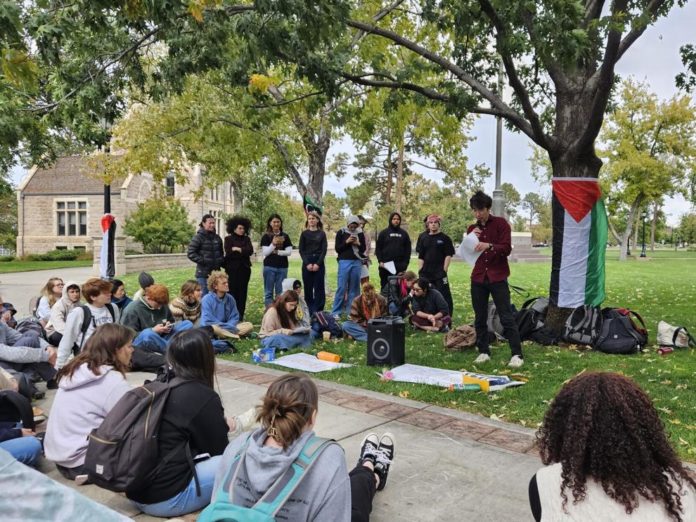Across OUSD teachers planned to hold unsanctioned lessons, “teach-ins”, that would cover the war in Gaza. The teach-ins were organized to be held Wednesday the 6th as well as Tuesday the 5th in the case of block periods.
An Oakland Tech parent shared her concerns with me. She initially heard of the teach-ins through a posting on Parent Square made by the OUSD superintendent, just a couple days before the teach-ins would be held. After receiving the update, she researched more information on the matter and found posts from Jewish families concerned that OUSD was condemning their religion. She worried about the potential overshadowing of issues in Israel the teach-ins would bring. She quote, “to present only one side of the argument and not give equal time to both sides is basically like “leading the witness”’. She doesn’t mind what sides teachers take, and is not against the support of Palestine itself. Though she did not have access to the material teachers used in their lessons, through the concerns she read believed the design of the teach-ins restricted the education students would receive on the entire conflict.
ABC7 estimated around 100 teachers across OUSD, including our AP Computer Science teacher, Ms. Pollack, held their own teach-ins that week. Ms. Pollack was concerned that her students were not being educated or informed about the war in Gaza. When she was updated on the OEA’s resolution, she organized a lesson and intended to bring awareness to the history and context of the situation. She states, “I wanted to give them an understanding of the context of the current events because there’s so much bias in the media.” The lesson was generally about technology’s role in colonialism and covered topics such as Cobalt mining in Congo, the war between Israel and Palestine, and Israel’s use of surveillance technology. She prepared a slideshow detailing the attack on October 7th, what Hamas is, their stated intention, Israel’s response, and left an open form for students to ask anonymous questions. She shared all perspectives as she finds it to be necessary to observe the conflict from all sides and without bias. She states, “I wanted them to understand this conflict in a way where Jewish safety and Palestinian safety weren’t antithetical to each other.” I asked Ms. Pollack how she’s receiving parental concern about antisemitism and if she finds it apparent to the lessons. She is aware of arising anti-semitism and reports there was recently a swastika in one of the boys bathrooms. However, she finds the opposition to calling Israel’s actions to be colonialism a bias and that “it’s native people being pushed off their land.” Ms. Pollack has a Jewish background herself, and strongly emphasizes that “we can criticize the actions of religious-nationalist governments without criticizing the religions or people they claim to represent.”
Mr. Goodwin, a chemistry teacher within the RPL academy also instructed his own lesson. Mr. Goodwin heard of the teach-ins through a group called OEA for Palestine. According to him a lot of the curriculum provided by the district was “not two sided, and in fact a lot of it was from pro-zionist lobbying groups.” This disparity led to the creation of the teach-ins, as educators aspired to provide a holistic take on the story. Mr. Goodwin based his own lesson off of the template the group OEA for Palestine made, he also taught about media bias and how to perceive news objectively. He felt his students were engaged in the lesson and left curious to research it on their own. The class also made guidelines on how to respect and communicate with each other about topics like these. When asked why they’re learning this in a chemistry class, Goodwin told his students “it is part of chemistry to be able to investigate using a variety of conflicting sources or data and come up with your own evidence based conclusion.” On the note of parental criticism, before the teach-ins, Mr. Goodwin observed many parents concerned with the curriculum being anti-semetic, however, he feels the teachers made an agreeable curriculum that didn’t take any side. After the lessons actually went through, he didn’t experience the anticipated criticism from parents.
Though the teach-ins began a lot of speculation, it has ultimately become a lesson in restraining assumption. Both the lessons themselves, and the influence they had on the community have started the discussion of approaching a matter from all angles, and taking your feelings out of it in order to see things for what they are. The lessons were designed to give students statistical information and as Ms. Pollack said, it is mandatory to see things from all angles in order to understand what’s going on. In the community, many parents latched onto the idea of what was happening, without actually knowing what was going on. For people of all ages, it is important to develop the skill of interpreting a conflict selflessly, in order to hold space for all sides.
“About 100 Oakland teachers held unsanctioned ‘teach-in’ to discuss Palestinian cause”, Hassan, December 6th ’23
